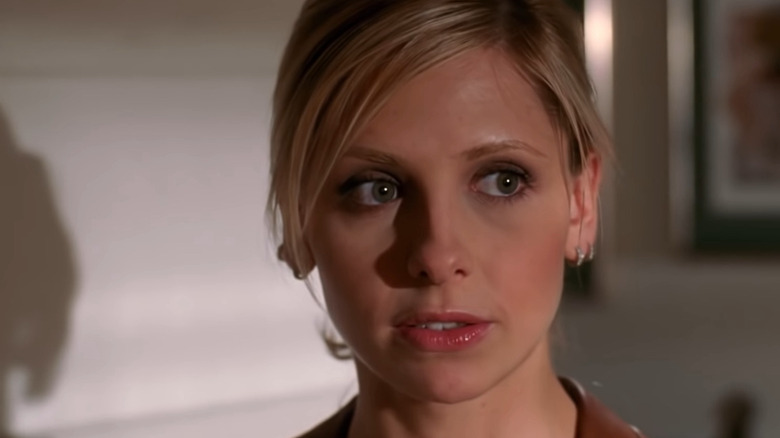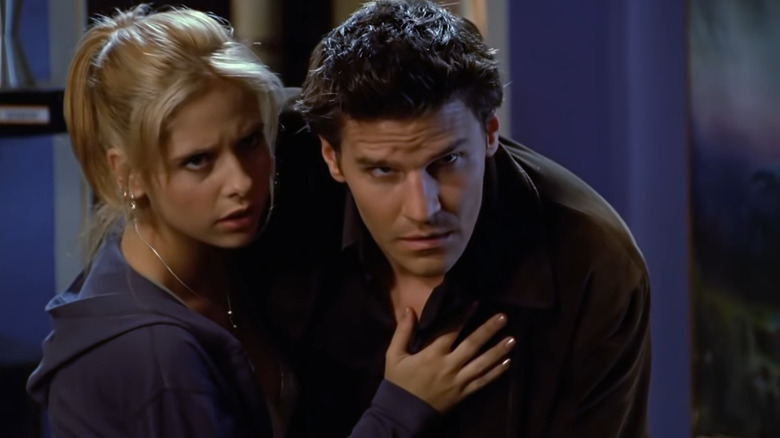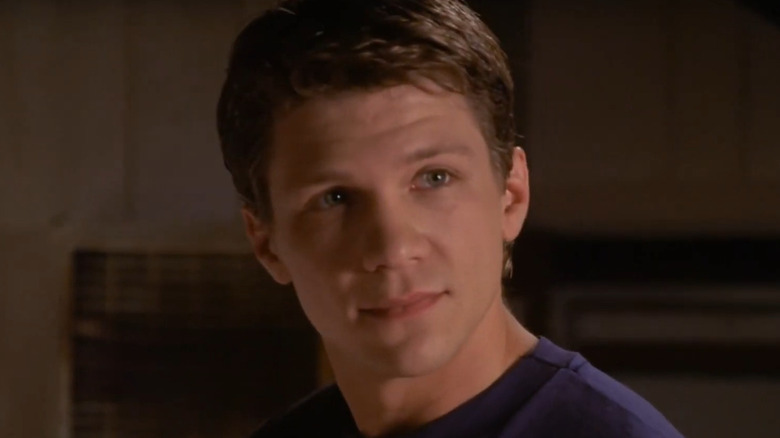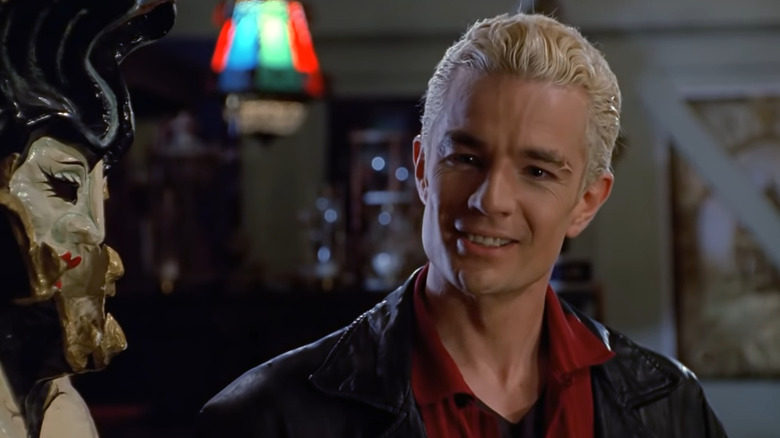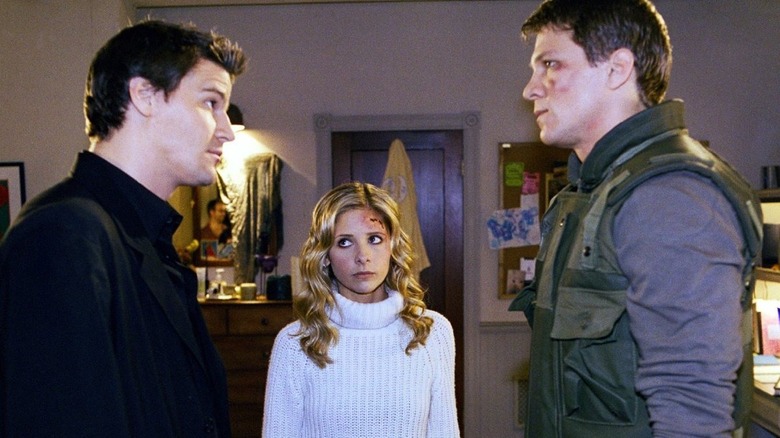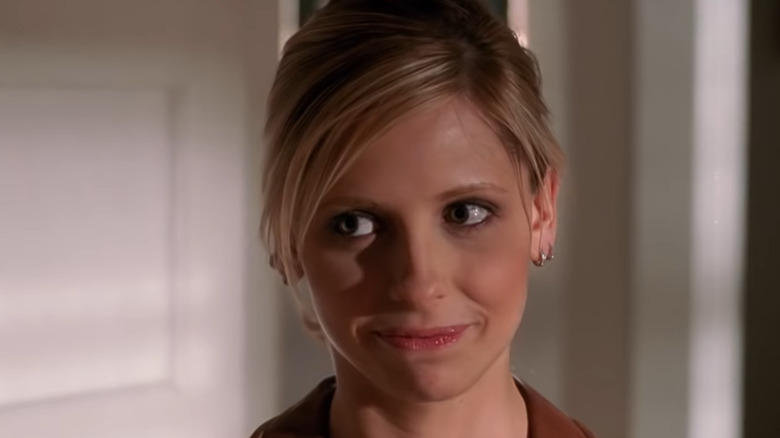Joss Whedon Believed Buffy Could Never Have A 'Healthy Relationship'
We may receive a commission on purchases made from links.
Love stories are difficult on television. We've had plenty of them, of course, but there is a prevailing thought about TV couples; if you hook them up and make them happy, people will stop watching the show. The first story that comes to mind is David Addison (Bruce Willis) and Maddie Hayes (Cybill Shepherd) from "Moonlighting." The show was based on the angry flirtation between the two of them, and when they finally got together, the show suffered, both in audience opinion and ratings. There were other reasons for the end of "Moonlighting," but that is often cited as the main one. "Cheers" is another popular one that suffered once the main characters Sam (Ted Danson) and Diane (Shelley Long) got together. It's something "Buffy the Vampire Slayer" creator Joss Whedon cites as the reason Buffy's relationships never really went well.
Whedon spoke about this in a 2003 interview with Salon. He felt he could never give Buffy a relationship that lasted because no one wanted to see her happy. Oh, I beg to differ, and I don't think I'm alone here.
'True love is not allowed to run smooth'
In the interview, the question Whedon was asked implied that even though a fan base might want characters to get together, "that often doesn't leave the narrative with any place to go." Whedon mentioned Sam and Diane and said:
"That's why we had Angel go bad when he and Buffy got together. Because — and I've gotten into so much trouble for this phrase — what people want is not what they need. In narrative, nobody wants to see fat, married Romeo and Juliet, even if fat, married Romeo and Juliet happen to be [Dashiell Hammett's detective couple] Nick and Nora Charles and they're really cool and having a great time in their lovely relationship and really care about each other and have nice, well-adjusted children. Guess what? People don't want to see it."
Fatphobic comment aside, Nick and Nora are the protagonists of "The Thin Man" movies. The first one came out in 1934 and spawned five sequels, a series, a radio play, and more, so Whedon's example already disproves his approach.
This makes sense for a show like "Moonlighting," which is about a relationship, because once the pair gets together, what's left to watch? "Buffy the Vampire Slayer," however, wasn't just about Buffy (Sarah Michelle Gellar) and Angel (David Boreanaz) and the whole will-they-won't-they of it all. It was also about fighting monsters, high school/college friendships, a mentor dealing with his own past, a young woman who is trying to navigate being a hero, unlike the ones she grew up reading about, and trying to have a normal life as well.
' ... When they were happy, it made people crazy'
Whedon went on to say:
"That was the problem we ran into with Riley. We said, 'Let's give Buffy a healthy relationship,' and people didn't want it. They did some great work together. But at the same time, when they were happy, it made people crazy. We found this with Willow and Tara, we found it with Gunn and Fred [from 'Angel']. It's fine for a while, but ultimately the course of true love is not allowed to run smooth."
Perhaps it was less that people didn't want to see Buffy happy and more that they kept putting her with the wrong person. There were plenty of ways to make her unhappy, like, you know, vampires, her mom dying, and friendship issues ... or you could have kept her alone because she wanted it that way. I love love stories on TV, but the issue with "Buffy" was the guys. Maybe we shouldn't have punished Buffy for having sex by making her boyfriend turn dark ... this isn't a '70s horror film.
Angel was turned in 1753, so by the 1990s, he wasn't exactly young. He was hooking up with a teenager! The real issue is that it was creepy, and in the end, they didn't really have anything in common besides knowing about monsters. By Buffy's graduation, everyone knows that. I'm honestly glad their relationship ended, but not because I didn't want to see her happy. I wanted to see her with someone who wasn't a gross age mismatch.
Riley (Marc Blucas) wasn't the right relationship either. He was a boring wet sock of a character (and this is absolutely no reflection on Blucas), and no one wanted to see this brilliant and powerful young woman with a milquetoast guy like Riley.
There are better people out there than Angel and Riley
If we're talking about Willow (Alyson Hannigan) and Tara (Amber Benson), that's another issue altogether. I loved them! There is a reason everyone still talks about this being the worst version of the trope "bury your gays." If they let them continue, we (gasp) might have seen a healthy relationship that wasn't heteronormative on television. Would any of you have been upset to see Willow happy? While the dark Willow storyline was a great one, Tara's death didn't have to be the trigger. I would have loved seeing Tara fight to bring Willow back to herself. That's conflict enough, no?
The issue is that if you're already planning to split up a couple, you're going to write one or both of them with enough flaws to make that happen. I'm not arguing that characters should always have great relationships because that's not reflective of real life. I'm saying it's okay to let some of them be happy. Look at Harley Quinn and Poison Ivy from the HBO animated series. It works because the writers put more into the story than just their relationship. Other things are going on.
Frankly, it's lazy to say that no one wants to see characters happy. Some of us do, and it doesn't have to be every character. If you decide before you write that your main character can't be happy, you've got lazy, predictable, and frankly, boring tension. I want to root for characters to get together. I don't want to do so, knowing the writers won't ever let it happen because ... TV. What if you let them work as partners? What if you let the tension between them be about the situation you wrote about and not just because you think people only want to watch misery?
'If Joss wants to argue that every relationship must die to keep things interesting, that's ridiculous'
Though I'm behind on "The Last of Us," even I know that a certain happy couple (even in the very worst of circumstances) was all over social media. Love is wonderful to see, and it doesn't have to derail a narrative if you have a good storyline. I want to see some characters learn that the beginning of a relationship is great, but there is more to happily ever after. I spoke about this with Dr. Travis Langley, professor, psychologist, and editor and lead author for "Stranger Things Psychology: Life Upside Down." (Full disclosure: I wrote a chapter for that book and most of the others in the PsychGeeks series.) Dr. Langley was as surprised as I was about the use of Nick and Nora as an example of what people don't want to see. He mentioned a great example of a relationship working and not ruining a show; "Friends." Dr. Langley said:
"Chandler and Monica hooked up at the end of [the] 'Friends' fourth season. They moved in together a year later, engaged a year after that, then married. The couple had things to work out along the way but never broke up. They stayed together through the series finale in season 10. Fans continued to care about them. Some other relationships came and went on the show, yes, but theirs worked, and they still had plenty of stories to tell. If Joss [Whedon] wants to argue that every relationship must die to keep things interesting, that's ridiculous. It's unrealistic. It's immature. That sounds like the reasoning of someone who does not understand relationship success himself, someone who gets bored with a relationship when it's working."
What's so terrible about seeing people happy?
As Dr. Langley says, other relationships were on and off, but Monica (Courteney Cox) and Chandler (Matthew Perry) worked. In fact, he mentioned the dialogue where Monica says, "Wasn't it a lot more exciting when we were y'know all over each other all the time?" and Chandler says he's more excited about where they are now. He said, " ... to get past the beginning and still be around each other all the time, I think that's pretty incredible."
I'm going to be fair and remind everyone that Whedon's interview was from 2003. We accepted different things from our TV shows, and show creators like Joss Whedon, back then. "Buffy" was also a death fest, and I say this as someone who watched every single episode of this and "Angel." (I really loved Gunn and Fred together, by the way.) I keep thinking about what we could have seen if Willow and Tara had been allowed to stay together. What could we, and Buffy, have experienced if Jenny Calendar (Robia Scott) and Giles (Anthony Head) had been a team rather than the show killing her off? What if Buffy had found a person who could have been a real partner? She'd still be dealing with monsters and her regular life being stolen. She'd still have her mother's passing, her own death(s), friend drama, and a musical episode. She just wouldn't have been without someone to share it with.
Frankly, I'm sick of this "no one can be happy in a relationship" trope on TV. We've had enough darkness in the real world. It would be nice to hold up true love against mushroom zombies, murderous family politics, evil from beyond, the Empire, and everything else the small screen can throw at characters. Buffy deserved better.
